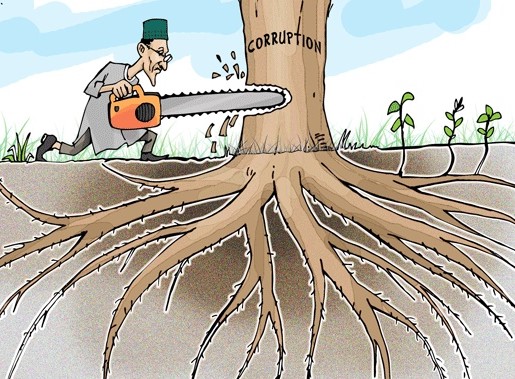
Sola Olorunfemi, General Secretary of AUTOBATE reports the opinions of the national dialogue on the fight of the Buhari led government against corruption
The Federal Government’s Presidential Advisory Committee Against Corruption held a two day national dialogue on 2nd and 3rd March, 2017. According to the Global Foundation Integrity (GFI), in terms of money fraudulently transferred out of the continent, Africa has lost about $854billionUSD between 2008 and 2016 with Nigeria alone accounting for $90 billion USD out of these.
One of President Muhammad Buhari’s campaign promises was to wage war against corruption. A major case is the $1.2 billion arms deal which was allegedly siphoned through the office of the former Chief Security Adviser, Ibrahim Dasuki. Also treasury looters are daily being exposed, tracked to specific politicians, mainly from the Peoples Democratic Party (PDP). Billions of dollars have been recovered while culprits are being prosecuted by the Economic and Financial Crimes Commission (EFCC). However, only a couple of culprits have been sentenced so far, making the scenario look politicized.
The masses (and the those sections of the bosses’ class directly affected) have criticized this one sided approach to the anti-corruption campaign targeted only at the opposition party (PDP). The Government allows high profile cases of corrupt politicians who cross carpet into the APC to die down.
Efforts to fight corrupt practices are not transparent if the corruption cases against the present Secretary General of Federation and many other accused politicians in the ruling party are not investigated and prosecuted in the same way as those of PDP politicians.
According to Professor Mike Kwanashe, the Buhari government cannot make any headway in fighting the corrupt system without re-introducing public welfare and a socialist method. The Structural Adjustment Programmes from the 1980s which destroyed the economy of sub-Saharan Africa also led to increased corruption.
Interestingly, Chattam House presented a research report based on findings on causes and solutions to corruption in Nigeria. Elizabeth Donnelly and Dr Koni Hoffman presented their summary findings that without the transformation of society there can be no permanent solution to corruption.
The panelists agreed that global capitalism creates a situation in which many Nigerians live in abject poverty and provide cheap labour for capitalist investors. The capitalist philosophy therefore has eroded the culture of encouraging honesty and hard work.
Similarly in the public sector, the average politician makes so much money, but the average civil servant does the work. Government and private employers should pay living wages and provide other non-intangible elements such as improved quality of the work environment, to encourage the ordinary worker.
Issues of equity and inequality in administration of justice were raised by participants. Many agreed that people are not equal before the law in reality. The administration of justice is often delayed and sometimes denied to the common people. This was noted to be a major constraint in the anti corruption war.
Among the key recommendations made by the dialogue were:
* Youth groups should be engaged in the fight against corruption.
* Whistle-blowers should be protected from reprisal and harassment.
* Religious leaders should lead by example.
* There should be adequate funding and staffing of anti-corruption agencies.
* A hall of shame should be established to profile corrupt people, especially politicians.
* There should be legislation to protect journalists from financial insecurity.
* Every public office holder or politician accused of corruption should step down from office.
* Government should gradually reduce the award of contracts and increasingly rely on direct labour within the public service to reduce opportunity for corruption.
* The presumption of innocence of accused person should be reversed when it concerns illicit or unjust enrichment by a public officer.
* Appointment into public offices should be based on qualifications rather than ethnic or religious considerations. The issue of state of origin should be discouraged with respect to any national issue.
The direction of the debate at the dialogue was more against the government than in support of its anti-corruption campaign. The current government was elected on its anti-corruption policy to pay for social services. But many people feel that the government needs to do far more. It is however unlikely that any government of the bosses’ can ever wipe out corruption because it is part and parcel of how capitalism works.
Working-class people need to organize and smash the pro-rich system that promotes corruption, replacing it with democracy from below. A new form of government rooted in workers’ power in the communities as well as workplaces, with delegates that are easily recalleable if they fail to serve the interests of the working masses is what can bring about an end to corruption. This is the socialist alternative.








